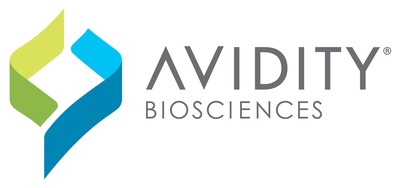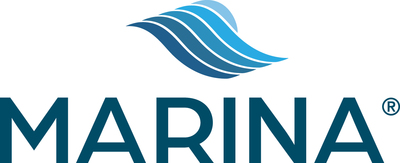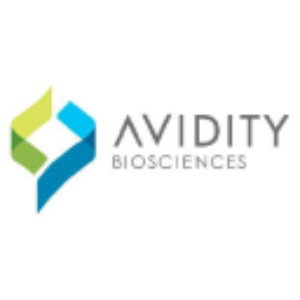Avidity Biosciences Announces Positive Topline Data from AOC 1001 Phase 1/2 MARINA™ Trial Demonstrating Functional Improvement, Disease Modification and Favorable Safety and Tolerability Profile in People Living with Myotonic Dystrophy Type 1
Topline data presented at AAN annual meeting showed AOC 1001 achieved directional improvements in multiple functional endpoint assessments - myotonia (vHOT), measures of strength (total QMT) and mobility (10mWRT, Timed Up and Go)
AOC 1001 data demonstrate favorable safety/tolerability profile with most adverse events mild or moderate
Topline AOC 1001 data identify dose range for pivotal study; Avidity continues to work to resolve partial clinical hold
Volume 7 of investor and analyst event today at
"The AOC 1001 topline data demonstrated directional improvement across a variety of functional assessments in patients with DM1, including myotonia and muscle strength in a six-month period. This result is more than we could have anticipated in such a short time. These AOC 1001 data are remarkable and could make a real impact for people living with DM1," said
The Phase 1/2 MARINA trial is a randomized, double-blind, placebo-controlled study designed to evaluate the safety and tolerability of single and multiple ascending doses of AOC 1001 administered intravenously in adults with DM1. Topline data were assessed from a 3:1 randomized study with 38 participants, who were administered one dose of 1 mg/kg AOC 1001, three doses of either 2 mg/kg AOC 1001 or 4 mg/kg of AOC 1001 (reflected as siRNA dose), or placebo. AOC 1001 Phase 1/2 topline data demonstrated:
- Directional improvement in multiple functional assessments including measures of myotonia, strength and mobility:
- Myotonia was measured by video hand opening time (vHOT) and is a hallmark of DM1 where relaxation of key muscle groups is impaired
- Measures of strength included the Quantitative Muscle Testing (QMT) total score which is based on six muscle groups from both the upper and lower body
- Mobility was assessed by the 10-meter walk run test (10mWRT) and the Timed Up and Go test
- The endpoints used in MARINA measure important aspects of the disease and correspond to those utilized in the ongoing END-DM1 natural history study
- Meaningful DMPK reduction and splicing changes in participants treated with AOC 1001
- Splicing changes followed by directional improvements in functional measures at 2 mg/kg and 4mg/kg doses of AOC 1001
- AOC 1001 demonstrated broad splicing improvements in more than a thousand genes impacted by DM1, confirming activity in the nucleus
- Favorable safety and tolerability profile of AOC 1001 with most adverse events mild or moderate
"The topline data from the MARINA trial reinforce our belief in the potential for AOC 1001 to be an effective treatment for people living with the devastating impact of DM1. Data from MARINA exceeded our expectations and delivered a robust data package to support advancement into a pivotal study. We are focused on designing the quickest path to bring AOC 1001 to patients and look forward to discussions with the FDA," said
Avidity continues to work with the
In-person and Video Webcast Information
The company is hosting Volume 7 of its investor and analyst event series today in
The Phase 1/2 MARINA topline presentation at the AAN Annual Meeting will be available on the "Publications" page on Avidity's website.
About the Phase 1/2 MARINA™ Trial
The MARINA™ trial is a randomized, double-blind, placebo-controlled, Phase 1/2 clinical trial that enrolled 38 adults with DM1. The primary objective of this study was to evaluate the safety and tolerability of single and multiple ascending doses of AOC 1001 administered intravenously. The MARINA trial assessed the activity of AOC 1001 across key biomarkers, including spliceopathy, an important biomarker for DM1, and knockdown of DMPK mRNA. Though the Phase 1/2 trial was not powered to assess functional benefit, it explored the clinical activity of AOC 1001 in multiple measures of muscle function including myotonia, muscle strength, measures of mobility as well as patient reported outcomes and quality of life measures. Patients have the option to enroll in MARINA-OLE, an open label extension study, at the end of the post-treatment period. For more information on this study click here or visit http://www.clinicaltrials.gov and search for NCT05027269.
About the Phase 2 MARINA-OLE™ Study
MARINA-OLE™ is an open-label, multi-center trial designed to evaluate the long-term safety and tolerability of AOC 1001 in participants with DM1 who were previously enrolled in the MARINA Phase 1/2 trial. This trial will continue to evaluate the safety, tolerability, PK, PD, and efficacy of AOC 1001 in participants enrolled in the randomized, placebo-controlled, Phase 1/2 MARINA clinical trial. Participants who enroll in the MARINA-OLE study will receive quarterly doses of AOC 1001 regardless of whether they received active treatment or placebo in the MARINA study. The total duration of active treatment with AOC 1001 in the MARINA-OLE is approximately 24 months. Once patients have completed active treatment, there will be a nine-month safety follow-up period. Avidity may extend active treatment beyond 24 months at a future timepoint. For more information on this study click here or visit http://www.clinicaltrials.gov and search for NCT05479981.
About AOC 1001
AOC 1001, Avidity's lead product candidate utilizing its AOC platform, is designed to address the root cause of DM1 by reducing levels of a disease-related mRNA called DMPK. AOC 1001 consists of a proprietary monoclonal antibody that binds to the transferrin receptor 1 (TfR1) conjugated with a siRNA targeting DMPK mRNA. In preclinical studies, AOC 1001 successfully delivered siRNAs to muscle cells, resulting in durable, dose-dependent reductions of DMPK RNA across a broad range of muscles including skeletal, cardiac, and smooth muscles. AOC 1001 is currently in Phase 1/2 development with the ongoing MARINA™ trial in adults with DM1. Patients in the MARINA study are eligible to enroll in the MARINA-OLE™ study. The
About Myotonic Dystrophy Type 1
Myotonic dystrophy type 1 (DM1) is an underrecognized, progressive and often fatal disease caused by a triplet-repeat in the DMPK gene, resulting in a toxic gain of function mRNA. The disease is highly variable with respect to severity, presentation and age of onset, however all forms of DM1 are associated with high levels of disease burden and may cause premature mortality. DM1 primarily affects skeletal and cardiac muscle, however patients can suffer from a constellation of manifestations including myotonia and muscle weakness, respiratory problems, fatigue, hypersomnia, cardiac abnormalities, severe gastrointestinal complications, and cognitive and behavioral impairment. Currently, there are no approved treatments for people living with DM1.
About Avidity
Forward-Looking Statements
Avidity cautions readers that statements contained in this press release regarding matters that are not historical facts are forward-looking statements. These statements are based on the company's current beliefs and expectations. Such forward-looking statements include, but are not limited to, statements regarding: the characterization and implications of the Phase 1/2 MARINA™ topline safety, biomarker and functional data; the importance of the topline data and Avidity's clinical programs as they relate to addressing rare diseases; expectations related to the MARINA trial; expectations related to new participant enrollment and the continuation of existing participants in the MARINA trial and enrollment of participants into the MARINA-OLE™ trial; the timing and progression of such clinical programs and the dosage levels to be administered therein; expectations related to Avidity's discussions with, and data to be provided to, the FDA and any change of status in the existing partial clinical hold; the safety, tolerability and benefits of AOC 1001; the severity of adverse events related to AOC 1001; the timing of release of data from the MARINA-OLE trial; the potential of Avidity's product candidates to treat rare diseases; the potential of the AOC platform and the potential of AOCs to target a range of different cells and tissues beyond muscle tissues, and to address diseases beyond those targeted by Avidity's current product candidates. The inclusion of forward-looking statements should not be regarded as a representation by Avidity that any of these items will be achieved. Actual results may differ from those set forth in this press release due to the risks and uncertainties inherent in our business, including, without limitation: Avidity may not be able to resolve the partial clinical hold and the analysis related to the underlying cause of the serious adverse event, which may result in delays in the clinical development of AOC 1001; additional participant data related to AOC 1001 that continues to become available may be inconsistent with the data produced as of the date hereof and the conclusions drawn therefrom; unexpected adverse side effects or inadequate efficacy of Avidity's product candidates that may delay or limit their development, regulatory approval and/or commercialization, or may result in additional clinical holds, recalls or product liability claims; Avidity is early in its development efforts; Avidity's approach to the discovery and development of product candidates based on its AOC platform is unproven, and the company does not know whether it will be able to develop any products of commercial value; potential delays in the commencement, enrollment and completion of preclinical studies or clinical trials; the success of its preclinical studies and clinical trials for the company's product candidates; the results of preclinical studies and early clinical trials are not necessarily predictive of future results; Avidity's dependence on third parties in connection with preclinical and clinical testing and product manufacturing; regulatory developments in the United States and foreign countries, including acceptance of INDs and similar foreign regulatory filings and the proposed design of future clinical trials; Avidity could exhaust its available capital resources sooner than it currently expects and fail to raise additional needed capital; and other risks described in our Annual Report on Form 10-K for the year ended December 31, 2022, filed with the
Investor Contact:
(858) 401-7900 x550
investors@aviditybio.com
Media Contact:
(858) 401-7900 x550
media@aviditybio.com
![]() View original content to download multimedia:https://www.prnewswire.com/news-releases/avidity-biosciences-announces-positive-topline-data-from-aoc-1001-phase-12-marina-trial-demonstrating-functional-improvement-disease-modification-and-favorable-safety-and-tolerability-profile-in-people-living-with-myotonic-dyst-301809804.html
View original content to download multimedia:https://www.prnewswire.com/news-releases/avidity-biosciences-announces-positive-topline-data-from-aoc-1001-phase-12-marina-trial-demonstrating-functional-improvement-disease-modification-and-favorable-safety-and-tolerability-profile-in-people-living-with-myotonic-dyst-301809804.html
SOURCE









